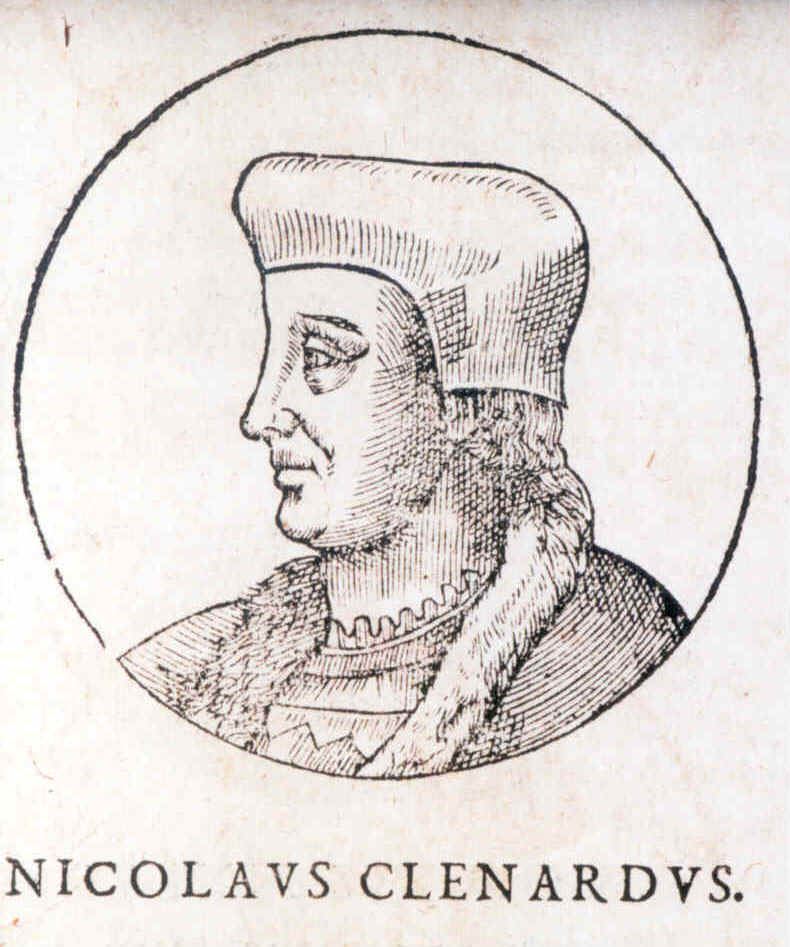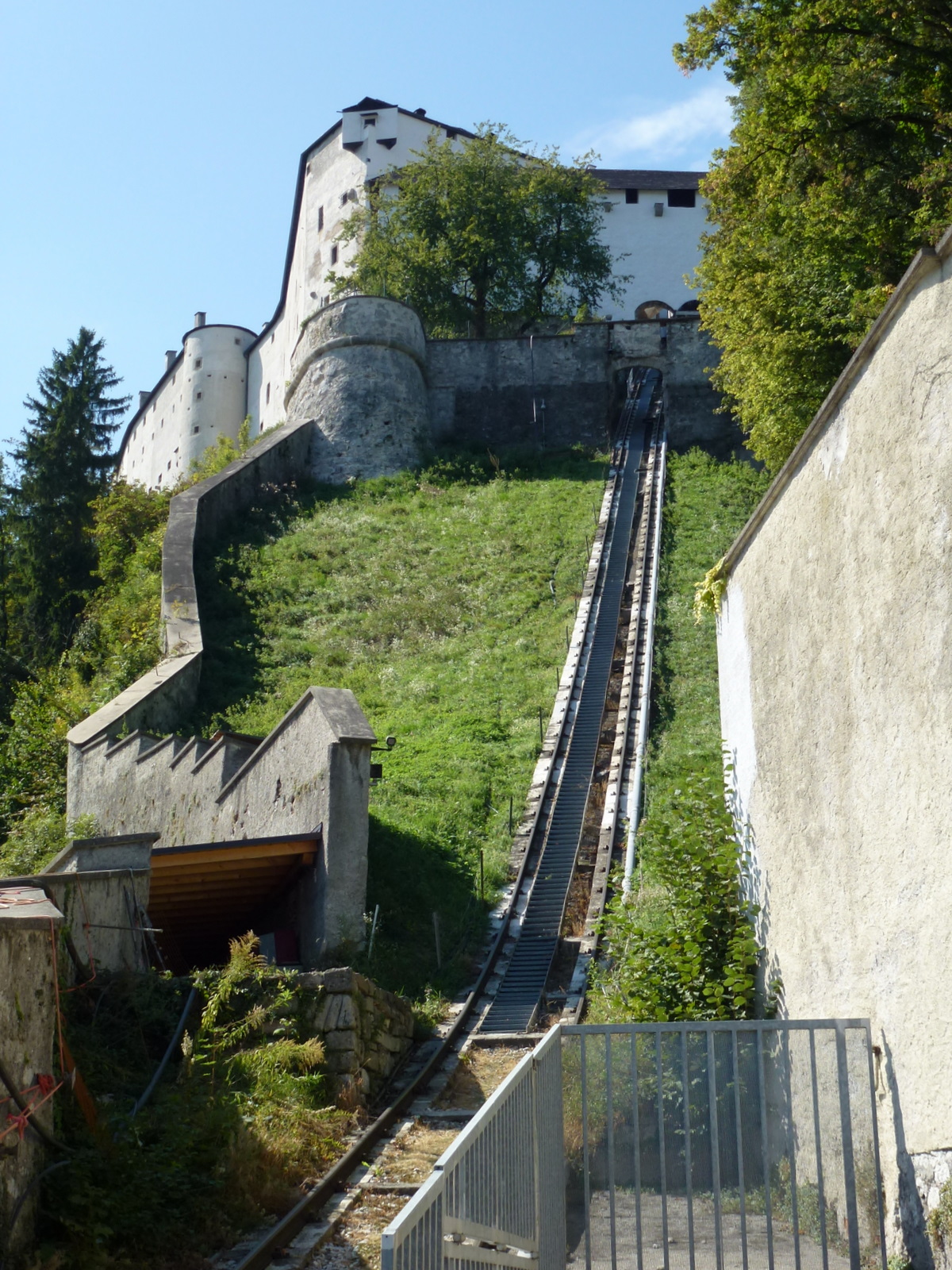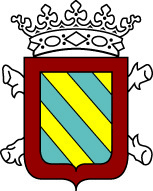|
Nicolas Cleynaerts
Nicolas Cleynaerts (Clenardus or Clenard) (5 December 1495 – 1542) was a Flemish grammarian and traveler. He was born in Diest, in the Duchy of Brabant. Life Cleynaerts was a follower of Jan Driedo. Educated at the University of Leuven, he became a professor of Latin, which he taught by the conversational method. A desire to read the ''Koran'' led him to try to establish a connection between Hebrew and Arabic. These studies resulted in a scheme for proselytism among the Arabs, based on study of the language, which should enable Europeans to combat Islam by peaceful methods. In pursuit of this, he travelled to Spain in 1532, and after teaching Greek at Salamanca was summoned to the court of Portugal as tutor to Dom Henrique, brother of João III. He found another patron in Louis Mendoza, marquis of Mondéjar, governor general of Granada. There with the help of a Moorish slave he gained a knowledge of Arabic. He tried in vain to gain access to the Arabic manuscripts in ... [...More Info...] [...Related Items...] OR: [Wikipedia] [Google] [Baidu] |
Spanish Inquisition
The Tribunal of the Holy Office of the Inquisition ( es, Tribunal del Santo Oficio de la Inquisición), commonly known as the Spanish Inquisition ( es, Inquisición española), was established in 1478 by the Catholic Monarchs, King Ferdinand II of Aragon and Queen Isabella I of Castile. It began toward the end of the Reconquista and was intended to maintain Catholic orthodoxy in their kingdoms and to replace the Medieval Inquisition, which was under Papal control. It became the most substantive of the three different manifestations of the wider Catholic Inquisition along with the Roman Inquisition and Portuguese Inquisition. The "Spanish Inquisition" may be defined broadly as operating in Spain and in all Spanish colonies and territories, which included the Canary Islands, the Kingdom of Naples, and all Spanish possessions in North, Central, and South America. According to modern estimates, around 150,000 people were prosecuted for various offences during the three-century ... [...More Info...] [...Related Items...] OR: [Wikipedia] [Google] [Baidu] |
Flemish Writers (before 1830)
Flemish (''Vlaams'') is a Low Franconian dialect cluster of the Dutch language. It is sometimes referred to as Flemish Dutch (), Belgian Dutch ( ), or Southern Dutch (). Flemish is native to Flanders, a historical region in northern Belgium; it is spoken by Flemings, the dominant ethnic group of the region. Outside of Flanders, it is also spoken to some extent in French Flanders and the Dutch Zeelandic Flanders. Terminology The term ''Flemish'' itself has become ambiguous. Nowadays, it is used in at least five ways, depending on the context. These include: # An indication of Dutch written and spoken in Flanders including the Dutch standard language as well as the non-standardized dialects, including intermediate forms between vernacular dialects and the standard. Some linguists avoid the term ''Flemish'' in this context and prefer the designation ''Belgian-Dutch'' or ''South-Dutch'' # A synonym for the so-called intermediate language in Flanders region, the # An indicatio ... [...More Info...] [...Related Items...] OR: [Wikipedia] [Google] [Baidu] |
Flemish Renaissance Humanists
Flemish (''Vlaams'') is a Low Franconian dialect cluster of the Dutch language. It is sometimes referred to as Flemish Dutch (), Belgian Dutch ( ), or Southern Dutch (). Flemish is native to Flanders, a historical region in northern Belgium; it is spoken by Flemings, the dominant ethnic group of the region. Outside of Flanders, it is also spoken to some extent in French Flanders and the Dutch Zeelandic Flanders. Terminology The term ''Flemish'' itself has become ambiguous. Nowadays, it is used in at least five ways, depending on the context. These include: # An indication of Dutch written and spoken in Flanders including the Dutch standard language as well as the non-standardized dialects, including intermediate forms between vernacular dialects and the standard. Some linguists avoid the term ''Flemish'' in this context and prefer the designation ''Belgian-Dutch'' or ''South-Dutch'' # A synonym for the so-called intermediate language in Flanders region, the # An indica ... [...More Info...] [...Related Items...] OR: [Wikipedia] [Google] [Baidu] |
16th-century Latin-language Writers
The 16th century begins with the Julian year 1501 ( MDI) and ends with either the Julian or the Gregorian year 1600 ( MDC) (depending on the reckoning used; the Gregorian calendar introduced a lapse of 10 days in October 1582). The 16th century is regarded by historians as the century which saw the rise of Western civilization and the Islamic gunpowder empires. The Renaissance in Italy and Europe saw the emergence of important artists, authors and scientists, and led to the foundation of important subjects which include accounting and political science. Copernicus proposed the heliocentric universe, which was met with strong resistance, and Tycho Brahe refuted the theory of celestial spheres through observational measurement of the 1572 appearance of a Milky Way supernova. These events directly challenged the long-held notion of an immutable universe supported by Ptolemy and Aristotle, and led to major revolutions in astronomy and science. Galileo Galilei became a champion ... [...More Info...] [...Related Items...] OR: [Wikipedia] [Google] [Baidu] |
1542 Deaths
Year 154 ( CLIV) was a common year starting on Monday (link will display the full calendar) of the Julian calendar. At the time, it was known as the Year of the Consulship of Aurelius and Lateranus (or, less frequently, year 907 ''Ab urbe condita''). The denomination 154 for this year has been used since the early medieval period, when the Anno Domini calendar era became the prevalent method in Europe for naming years. Events By place Roman Empire * King Eupator of Bosphorus pays tribute to Rome, due to the threat posed by the Alani. * The Antonine Wall is completed. Asia * Last (2nd) year of ''Yongxing'' era of the Chinese Han Dynasty. * Adalla becomes ruler of the Korean kingdom of Silla. By topic Religion * Anicetus becomes pope of Rome (approximate date). * Anicetus meets with Polycarp of Smyrna to discuss the Computus, the date of Easter in the Christian liturgical calendar. * Change of Patriarch of Constantinople from Patriarch Euzois to Patriarch La ... [...More Info...] [...Related Items...] OR: [Wikipedia] [Google] [Baidu] |
1495 Births
Year 1495 ( MCDXCV) was a common year starting on Thursday (link will display the full calendar) of the Julian calendar. Events January–December * February – King's College, Aberdeen, predecessor of the University of Aberdeen in Scotland, is founded on the petition of William Elphinstone, Bishop of Aberdeen. It is the first English-speaking university to teach medicine. * February 22 – Italian War of 1494–98: King Charles VIII of France enters Naples, to claim the city's throne. A few months later, he decides to return to France, and leaves Naples with most of his army, leaving a force under his cousin Gilbert, Count of Montpensier as viceroy. Syphilis is first definitely recorded in Europe during this invasion. (perhaps from French forces who may have contacted Croats fleeing an Ottoman army in the east). * May 26 – A Spanish army under Gonzalo Fernández de Córdoba lands in Calabria, with the purpose of ousting the French and restoring Ferdinand ... [...More Info...] [...Related Items...] OR: [Wikipedia] [Google] [Baidu] |
Royal Academy Of Belgium
The Royal Academies for Science and the Arts of Belgium (RASAB) is a non-governmental association which promotes and organises science and the arts in Belgium by coordinating the national and international activities of its constituent academies such as the National Scientific Committees and the representation of Belgium in international scientific organisations. RASAB was formed as a non-profit organization (Association without lucrative purpose) in 2001 by the Dutch-speaking academy KVAB ( Koninklijke Vlaamse Academie van België voor Wetenschappen en Kunsten i.e. ''Royal Flemish Academy of Belgium for Science and the Arts'') and by the French-speaking academy ARB ( i.e. ''The Royal Academy of Science, Letters and Fine Arts of Belgium''). The association is headquartered in the buildings of the former Royal Stables at the Academy Palace, Hertogsstraat 1 Rue Ducale B-1000 Brussels. History Academies RASAB was founded in 2001 by the two Belgian academies which are connecte ... [...More Info...] [...Related Items...] OR: [Wikipedia] [Google] [Baidu] |
Alphonse Roersch
Alphonse Roersch (1870–1951) was a Belgian philologist, professor at the University of Ghent.Louis BakelantsNécrologie: Alphonse Roersch (1870-1951) '' Revue Belge de Philologie et d'Histoire'', 29 (1951), pp. 999-1001. Life Roersch was born in Liège on 3 November 1870, and was educated at the Athénée royal de Liège, where he placed first in Latin. He graduated Doctor of Philosophy in 1891 and Candidate of Law in 1892. He studied in Paris (1892-3) and Berlin (1893-4) and began teaching at Ghent University in 1895. He took a particular interest in Latin Humanists, publishing studies of Joannes Loensis (van Loo) and of Nicolas Cleynaerts, and of the history of classical philology in Belgium. In 1907 he was appointed professor in Ghent.Victor Tourneur, "Roersch, Alphonse", ''Biographie Nationale de Belgique''vol. 32(Brussels, 1964), 622-625. All the articles on humanists published in the ''Biographie Nationale de Belgique'' between 1894 and 1938 were his work. He was also a con ... [...More Info...] [...Related Items...] OR: [Wikipedia] [Google] [Baidu] |
Victor Chauvin
Victor Chauvin (1844–1913), an Arabic and Hebrew professor at the University of Liège, wrote a number of notable books on Middle Eastern literature and folklore, orientalism, biblical history, and Sharia Sharia (; ar, شريعة, sharīʿa ) is a body of religious law that forms a part of the Islamic tradition. It is derived from the religious precepts of Islam and is based on the sacred scriptures of Islam, particularly the Quran and the H ..., including ''L`histoire de l`Islamisme'' and ''Bibliographie des Ouvrages Arabes Ou Relatifs Aux Arabes Publies Dans L'Europe Chretienne De 1810 a 1885''. References Belgian non-fiction writers Belgian male writers Academic staff of the University of Liège 1844 births 1913 deaths Male non-fiction writers {{belgium-linguist-stub ... [...More Info...] [...Related Items...] OR: [Wikipedia] [Google] [Baidu] |
Leuven
Leuven (, ) or Louvain (, , ; german: link=no, Löwen ) is the capital and largest city of the province of Flemish Brabant in the Flemish Region of Belgium. It is located about east of Brussels. The municipality itself comprises the historic city and the former neighbouring municipalities of Heverlee, Kessel-Lo, a part of Korbeek-Lo, Wilsele and Wijgmaal. It is the eighth largest city in Belgium, with more than 100,244 inhabitants. KU Leuven, Belgium's largest university, has its flagship campus in Leuven, which has been a university city since 1425. This makes it the oldest university city in the Low Countries. The city is home of the headquarters of Anheuser-Busch InBev, the world's largest beer brewer and sixth-largest fast-moving consumer goods company. History Middle Ages The earliest mention of Leuven (''Loven'') dates from 891, when a Viking army was defeated by the Frankish king Arnulf of Carinthia (see: Battle of Leuven). According to a legend, the city's red ... [...More Info...] [...Related Items...] OR: [Wikipedia] [Google] [Baidu] |
Grammar
In linguistics, the grammar of a natural language is its set of structure, structural constraints on speakers' or writers' composition of clause (linguistics), clauses, phrases, and words. The term can also refer to the study of such constraints, a field that includes domains such as phonology, morphology (linguistics), morphology, and syntax, often complemented by phonetics, semantics, and pragmatics. There are currently two different approaches to the study of grammar: traditional grammar and Grammar#Theoretical frameworks, theoretical grammar. Fluency, Fluent speakers of a variety (linguistics), language variety or ''lect'' have effectively internalized these constraints, the vast majority of which – at least in the case of one's First language, native language(s) – are language acquisition, acquired not by conscious study or language teaching, instruction but by hearing other speakers. Much of this internalization occurs during early childhood; learning a language later ... [...More Info...] [...Related Items...] OR: [Wikipedia] [Google] [Baidu] |







